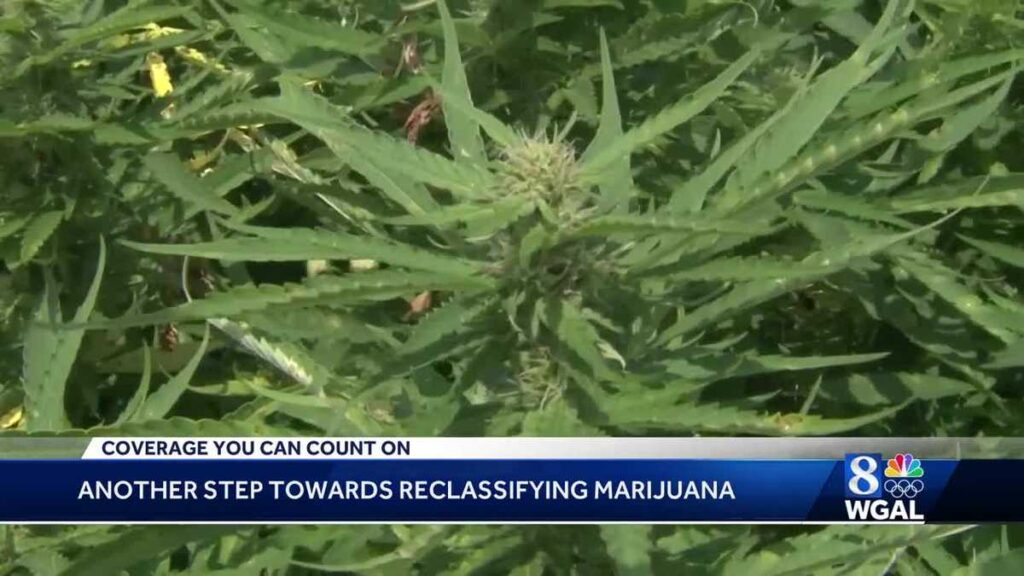The federal government has officially moved to reclassify marijuana as a less dangerous drug. The Drug Enforcement Administration filed paperwork Thursday to begin a 60-day public comment period before the new schedule goes into effect. This move would move marijuana from a scheduled drug to a Schedule 3 drug, but what does this mean? It's important to note that this proposal would make it illegal for recreational use nationwide. That doesn't mean it's legalized. However, the proposed changes represent significant changes to federal marijuana law going forward. “Too many people are incarcerated for simple possession or use of marijuana,” said Dr. Rahul Gupta, director of the National Drug Control Policy Office. On Thursday, President Joe Biden released a message from the White House. Too many lives have been ruined by failed efforts on marijuana, and I'm committed to writing about those mistakes,” Biden said. As commander in chief, the Justice Department is considering reclassifying marijuana. “Of course, the transition from Class 1 to Class 3 is important. Class 1 substances are typically things like heroin or LSD, which have no medical use and have a higher potential for addiction. This It's also historic because it allows for more drugs to be allowed,” says Gupta. he said. The director says this is also a move to level the playing field for people with past marijuana convictions. “We also know that if something like that happens, that conviction will last a lifetime for you and your family. “People can get their lives back and deserve a level playing field. We can get it and move forward,'' said Mr. Some community members are also participating in the reclassification. There's not much they can do for people who have served time for something as trivial as that, but they could be more lenient,” said Wilson Berger of Lancaster. Looking ahead, Gupta said there will be a 30-day period for the public to submit comments, after which an administrative law judge will make a recommendation to the attorney general, who will issue a final ruling. .
The federal government has officially moved to reclassify marijuana as a less dangerous drug.
The Drug Enforcement Administration filed paperwork Thursday starting a 60-day public comment period before the new schedule goes into effect.
This move would move marijuana from a scheduled drug to a Schedule 3 drug, but what does this mean?
It's important to note that this proposal would not legalize recreational use nationwide. However, the proposed changes represent significant changes to federal marijuana law going forward.
“Too many people are incarcerated for simple possession or use of marijuana,” said Dr. Rahul Gupta, director of the National Drug Control Policy Office.
On Thursday, President Joe Biden released a message from the White House.
“Too many people's lives have been ruined by our failed efforts on marijuana, and I am committed to writing about these mistakes,” Biden said.
As commander in chief, the Justice Department is considering reclassifying marijuana.
“Of course, the transition from Class 1 to Class 3 is important. Class 1 substances are typically things like heroin or LSD, which have no medical use and have a higher potential for addiction. This It's also historic because it allows for more drugs to be allowed,” says Gupta. he said.
The director said this is also a move to level the playing field for people with past marijuana convictions.
“We also know that if something like that happens, that conviction will stick with you and your family for the rest of your life. So people can get their lives back. They are on a level playing field. We can get a place and move forward,'' said Mr.
Some community members are also participating in the reclassification.
Wilson Berger, from Lancaster, said: “The current system of interfering with someone over something as trivial as that would cause a lot of problems. There's not much that can be done for people who have served time, but there is potential for more leniency. “There is,” he said. .
Looking ahead, Gupta said there will be a 30-day period for the public to submit comments, after which an administrative law judge will make a recommendation to the attorney general, who will issue a final ruling. .


